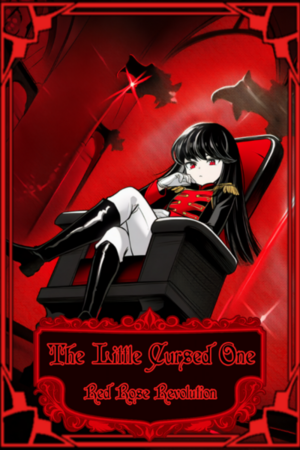Chapter 14:
Chapter 13: The Sound of People
The Little Cursed one: Red Rose Revolution
At the same time the two men were chatting at the café, there stood a solid building in the middle of the city's hustle and bustle, adorned with carvings of symbolic figures from the ancient liberators. This elegant place, which stood in stark contrast to the filthy and muddy surroundings, was the place of worship for the followers of the Lumen Mae religion scattered across the capital, Palaion.
Normally, this place remained quiet, especially with the growing distrust toward religion spreading among the people. This shift had only deepened since the beginning of the Age of Reasons, which had started about a century ago and still continued today. It was an era that encouraged people not to trust those in power, don't trust no one at all, and to test for themselves what they believed to be true. Before that age, Palanthein was a land where the people had been forced to think only what they were told, fed information from above that was barely more than illusion crafted by rulers and Clergy. The very idea that one could map all of human knowledge and gain access to it was, back then, revolutionary.
In that temple, which was usually quiet, there were now crowds of men surrounding a table and chair at its center. Seated there was a man with curly hair down to his neck, holding a feathered pen over several sheets of paper spread across the table. The man, whose face always seemed anxious, was named Kallein Dasmyr.
“N-na-name, occupation, place of origin, Mynseur?” asked Kallein, stuttering out of habit.
“Bikos, cargo lifter, block four,” the man replied firmly.
No one corrected the title. Mynseur is what they call it these days, not out of respect, but out of habit. It makes the question seem formal, even though the answer isn't formal at all.
Kallein himself wasn’t a religious person, he has no love for god that is fabricated by opportunists. The reason he came here was because he had heard the news that with the assembly meeting drawing near, temples across Palanthein would begin holding sessions where the people could voice their complaints to the King through the temple as a mediator. Since a few people present knew about his talent for writing, they entrusted Kallein with the task of putting their voices into words.
“C-complaint?”
“Tell that fat King!” the man shouted, unafraid of the temple officials watching nearby. “Yesterday I bought flour, and it was full of disgusting bugs! Fortunately, my family didn’t eat it!”
Kallein wrote down a description of the complaint. The man went on to explain how revolting the insects in his flour had been, to the point where those around him also felt sick just listening. He kept using curses that grew increasingly crude. Whether what he said truly happened or was exaggerated, Kallein wrote it exactly as the man said it. Since there were still many people waiting to speak, the man was eventually pulled back by a few people behind him.
“N-name, occupation, place of origin, Mynseur?”
Now it was the turn of an old man with a beard that had turned completely white. His appearance was a mess, his clothes torn in many places, revealing his frail, bony body. Yet behind that vulnerable look was a deep fury etched across his wrinkled face.
“Kostas, farmer, Pilin Village south of the city,” the old man replied.
Kallein wrote down the information and asked, “W-what is your complaint, Mynseur?”
“Justice for my wife and daughter!” The old man stepped closer to the table and slammed his hand against it, as if he had forgotten the weakness of his own body. “A week ago, tax collectors came to us. They struck my wife with their muskets! They also violated my daughter!” His voice was filled with raw emotion that could no longer be contained. Then he bowed his head and spoke in a quiet tone, “Now... they don’t even dare step outside the hut after what happened.”
Hearing that complaint, Kallein could do nothing but freeze like a stone, his heart breaking as he saw the man's face so full of despair. With trembling hands, he finally tried to write it down, holding back his anger and trying to stay composed.
“Disgusting!”
“How cruel!”
“Give this man’s family justice!”
But unlike Kallein, who managed to keep his rage in check, the people gathered around immediately started shouting at the temple officials—who were powerless to calm the furious crowd. After all, the religious institutions in Palanthein were also complicit in the kingdom’s tax system.
Shouts and curses erupted, filling the meeting hall. The situation worsened as one by one, the men present clenched their fists and approached the temple officials. The guards on duty struggled to defuse the chaos. Many of their comrades were spread thin protecting similar events elsewhere, so they were outnumbered. On top of that, some of them actually sympathized with the people's suffering.
"Enough!" someone shouted. "How much longer will we be left to starve while they dance on their banquet tables?"
"Murderers! Those nobles are murderers!" another yelled.
But before the chaos turned into a full-blown riot, a young man asked Kallein to stand for a moment. Seeing no ill intent in the young man's eyes, Kallein allowed it. The young man then took the chair and positioned it closer to the center of the angry crowd.
"Enough!" he said. "Your anger is justified. But if we explode now, we’ll lose our chance. This is our moment. Do not let emotion ruin it."
His voice cut through the noise. Bit by bit, the uproar subsided. Some bowed their heads. Others took deep breaths. Two men gently led the old man away from the center of the hall, whispering calming words. Perhaps a few still disagreed with the young man's call, but they could not deny that sessions like this were rare. It would all be for nothing if the event were canceled, especially when so many people had yet to voice their complaints.
The storm had passed, for now. The murmur of the crowd gradually softened into a heavy stillness. Kallein sat back down, his hands still trembling slightly, though his quill remained steady. He dipped it once more into the ink and gestured for the next speaker to come forward. Despite the tension lingering in the room, the line slowly began to move again. A tailor from the western district complained about rising fabric prices while his clients grew poorer by the day. A mother wept as she described her son’s arrest for stealing a loaf of bread and found dead two days later in the city jail. A former soldier limped forward to recount how, after twenty years of service and three lost fingers, he was denied his pension on a clerical error he couldn’t afford to correct. Kallein recorded each one with the same quiet diligence, his eyes lowered, his pen never resting.
This session had been going on since the morning, right after the temple’s routine service. Now that it was midday, the queue had started to thin out. However, many people who had already voiced their grievances still chose to stay and witness the event until it ended, instead of going home directly. In what had previously been the back rows, there gathered people commonly referred to as the educated class and professionals from the middle class, such as lawyers and doctors.
“Me, as a doctor, demand that tax equality be enforced! By what right are the nobles and temples exempted?!”
This wasn’t like before. These were no longer isolated complaints about failed harvests, broken carts, or corrupt local lords whose cruelty could be dismissed as personal faults. No, what now echoed through the hall was something far deeper. It felt as if the people had finally found the language to express a pain that didn’t belong to just one person, but to everyone. A collective wound, festering for years, was now spoken aloud with trembling voices and clenched fists.
After that, another educated man stepped forward and immediately said, “Why is it only nobles who can become officers in military? There should be open access to all fields, military, civil,” he paused for a moment, looking straight at the temple officials, and added, “or even the temples,” in a scornful tone.
The crowd erupted into laughter, turning to face the clergy whose expressions clearly showed their irritation at the mockery. Of course, they could do nothing and were forced to remain silent in front of the masses.
The young man who had previously calmed the chaos walked up to Kallein and asked, “So, what have you written so far, my friend Kallein Dasmyr?”
“U-uhmm… better quality food stock, justice for that poor man earlier,” Kallein read them aloud one by one, until he reached, “no more humiliation, no more privileges, equality for all.”
The young man went silent for a moment, then raised his index finger and shouted, “And also, La Libertien!”
The people around him erupted into applause, then followed his call in unison with a roaring cheer, “Vire la Libertien!”
The cries of long live freedom grew louder and didn’t stop echoing from the crowd. They didn’t care that they were now in a place considered deeply sacred. The guards simply stood by and watched the whole event like statues. They could have used the muskets in their hands, perhaps, but no soldier would be foolish enough to do something that would turn them into the target of a mob’s fury.
Feeling his task was done, Kallein decided to clean up the table he had used earlier, gathered a few of his writing tools, and packed them into his case. He made his way through the crowd, which was still shouting cries of liberty that continued to echo through the hall, until he finally reached the outside of the temple. He was now in a hurry, as today was his first day working as a lawyer at the Dermallis law firm, and he had to be at the office in an hour.
“Kallein! Kallein! I’ve been looking everywhere for you!”
“Dionel!? Wh-what are you doing here!?”
But just a few steps away from the temple, a blondish-haired boy of about ten years old called out to him from the side. He was a boy Kallein had known for a long time, since they were neighbors in the same apartment building. The boy was also the son of a young widow whom Kallein had fallen in love with, though that love had been blocked by the widow’s father.
“Someone in rather fancy clothes was looking for you at the apartment,” said Dionel. He reached into his trouser pocket, then pulled out a folded piece of paper. “He wanted to give you this, but since you weren’t home, my mother and I convinced him to leave it with us.”
Kallein took the paper from Dionel. “I-I see, th-thank you for your kindness.”
Dionel simply nodded and smiled sincerely. He immediately said goodbye after handing over the letter. He also mentioned he had promised to play with his friends.
Once Dionel was out of sight, Kallein quickly opened the letter. From its appearance alone, he could already guess what kind of letter it was. After all, in the past few days, he had put himself forward as a candidate for Deputy of the Third Pillar. Sooner or later, he knew the results would come, though he hadn’t known exactly when. The beginning of the letter was filled with typical formal nonsense. But as Kallein read toward the end, he found a line written in a different font than the rest—“NOT ELECTED.”
“Damn it!” Kallein spat, tearing the paper in frustration and tossing it into the muddy street.




Please sign in to leave a comment.